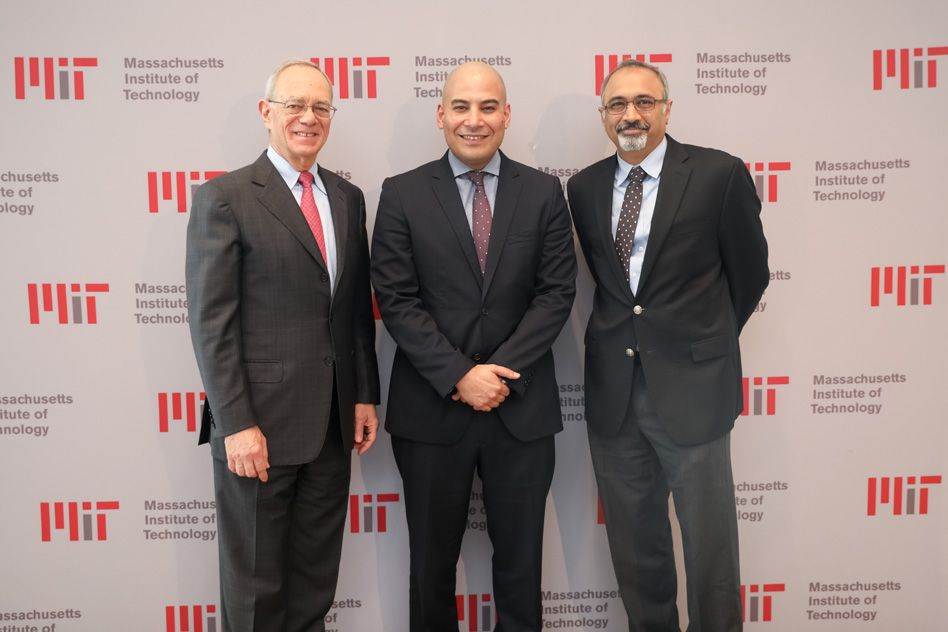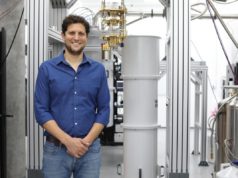
Today MIT and cofounder Community Jameel, which was established and is chaired by Mohammed Abdul Latif Jameel ’78, announced the creation of the Abdul Latif Jameel World Education Lab (J-WEL).
The global collaborative effort will help educators, universities, governments, and companies revolutionize the effectiveness and reach of education, and aims to help prepare people everywhere for a labor market radically altered by technological progress, globalization, and the pursuit of higher living standards around the world. A guiding focus of J-WEL will be learners in the developing world, populations underserved by education such as women and girls, and a growing displaced population that includes refugees.
“For years, Community Jameel’s commitment to finding practical solutions to complex global problems has inspired all of us at MIT,” says MIT President L. Rafael Reif. “With J-WEL, Community Jameel builds on that extraordinary legacy with an effort that will empower learners around the world and in the United States, opening educational pathways that are currently closed to millions. We are grateful to Community Jameel for their vision, their partnership, and their unwavering dedication to making a better world.”
J-WEL will be an anchor entity within MIT’s open education and learning initiatives that are led by MIT Vice President for Open Learning Sanjay Sarma. The three special interest groups integral to J-WEL’s mission — pre-K–12, higher education, and workplace learning — will each have faculty leads. Professors Angela Belcher and Eric Klopfer will direct pre-K–12, and Professor Hazel Sive will direct the higher education special interest group. A workplace learning faculty director will be named soon. M.S. Vijay Kumar, MIT’s associate dean of digital learning, will serve as J-WEL’s executive director and will work closely with the faculty leads. Faculty will receive J-WEL grants for research related to this initiative. J-WEL will also draw on existing educational resources at MIT, including the MIT Integrated Learning Initiative (MITili) and Office of Digital Learning, to research and apply what works best in the education of children, university students, and workers.
Leveraging MIT’s resources, J-WEL will convene a global community of collaborators for sustainable, high-impact transformation in education through research, policy, pedagogy, and practice. The lab will foster new initiatives and build a powerful collaborative of schools, governments, nongovernmental organizations, philanthropists, and businesses. Through these networks, J-WEL and MIT at large will gain input and insight from the regions, both domestic and international, where the new educational tools and methods will be deployed. Collaborative members will have special access to MIT programs and resources, such as trainings, workshops, and certification programs.
Fady Mohammed Jameel, president of Community Jameel International, says: “Education and learning are fundamental to a strong society and economy — they promote employment and create increased opportunity for all. While there has been progress made in improving education, there is always more that can be done. Enabling individuals to do their very best and reach their full potential, whatever their background, is a key priority for Community Jameel and the world. That is exactly why we are establishing the Abdul Latif Jameel World Education Lab with MIT.
“MIT is one of the most respected research universities in the world, and through J-WEL those involved in education will have special access to their programs and resources, such as training and workshops, as well as collaborative opportunities with MIT and other members. From our ongoing collaborations, including the Abdul Latif Jameel Poverty Action Lab and the Abdul Latif Jameel World Water and Food Security Lab, we have already seen firsthand the benefits of working with MIT, and J-WEL will build on that record of success.”
In an age of social and technological change, education is a critical tool for society. MIT’s approach has centered on understanding the processes of learning at a fundamental level, allying that understanding with the technological means to deliver learning, and then designing educational systems in the most effective ways possible. Building on MIT’s historic footprint in education at the childhood level (through STEM teacher education camps and programs such as Scratch), in the collaborative formation of new universities (such as Singapore University of Technology and Design and Instituto Tecnológico de Aeronáutica in Brazil), and in the education of professionals (through MIT Professional Education and MIT Sloan Executive Education), J-WEL will work with its global collaborators to improve the delivery and quality of educational opportunities using new digital, maker, and in-person “mind-and-hand” approaches to learning.
Early examples of MIT efforts in this arena include work at the high school level across India with the Tata Trusts, on teacher education with the Woodrow Wilson Foundation, improvements to workplace learning at Accenture, and expanded educational reach in the Arab world with the Abdulla Al Ghurair Foundation for Education.
“Tata Trusts has successfully partnered with MIT on seeding the Connected Learning Initiative (CLIx) that leverages the power of technology to enhance both teaching and learning, in high schools in India. The Trusts are also collaborating with the Tata Center for Education and Design at MIT to apply technical talent to address challenges in development. We look forward to J-WEL breaking new ground through applied research in education in India and the world,” says Mr. R. Venkataramanan, managing trustee of the Sir Dorabji Tata Trust, in India.
“We have a very special collaboration with MIT spanning several years, with a shared vision to bring to life new ways of learning for people at unprecedented scale,” says Rahul Varma with the Talent and Learning Office at Accenture. “Hearing about the plans for J-WEL reminds us of MIT’s expertise and commitment in helping to address major issues of the day. I have no doubt J-WEL will be a success and have significant impact.”
“It is exciting to see MIT put together an effort to share emerging best practices across the world in education, especially in the primary and secondary education spaces. The need for new thinking in these sectors is pressing, especially in STEM, and MIT is perfectly poised to take on this challenge,” says Arthur Levine, president of the Woodrow Wilson Foundation
“Through J-WEL, we will forge new and long-lasting collaborations as we learn, share, and train together, using the assets developed at MIT as well as by leveraging the community convened by J-WEL,” says Sarma. “To borrow an idea expressed by philosophers and educators across the centuries: J-WEL will help to spark fires in students’ minds, and enable educators to spark solutions to their communities’ most demanding challenges.”
“As we help young people prepare to navigate in an uncertain future, we cannot do so without re-imagining learning at every level, inside and outside formal schooling. This is why our collaboration with MIT on online learning is critical to our strategy to educate and upskill Arab youth. We welcome J-WEL and look forward to being a part of its visionary work, and we applaud Community Jameel for this important educational investment,” says Maysa Jalbout, CEO of the Abdulla Al Ghurair Foundation for Education.
The gift is part of MIT’s current $5 billion Campaign for a Better World and is consistent with Community Jameel’s focus on creating a better future. Abdul Latif Jameel Poverty Action Lab (J-PAL), established in 2003, seeks answers to poverty in a changing world. Abdul Latif Jameel World Water and Food Security Lab (J-WAFS), established in 2014, seeks answers to food and water scarcity issues as the population rises and global warming takes hold.

![[Galaxy Unpacked 2025] Making Everyday Life Special With](https://loginby.com/itnews/wp-content/uploads/2025/02/1739786271_Galaxy-Unpacked-2025-Making-Everyday-Life-Special-With-238x178.jpg)



![[Interview] How Does a Used Galaxy Device Become a Key Part](https://loginby.com/itnews/wp-content/uploads/2025/03/1743244674_Interview-How-Does-a-Used-Galaxy-Device-Become-a-Key-100x75.jpg)

